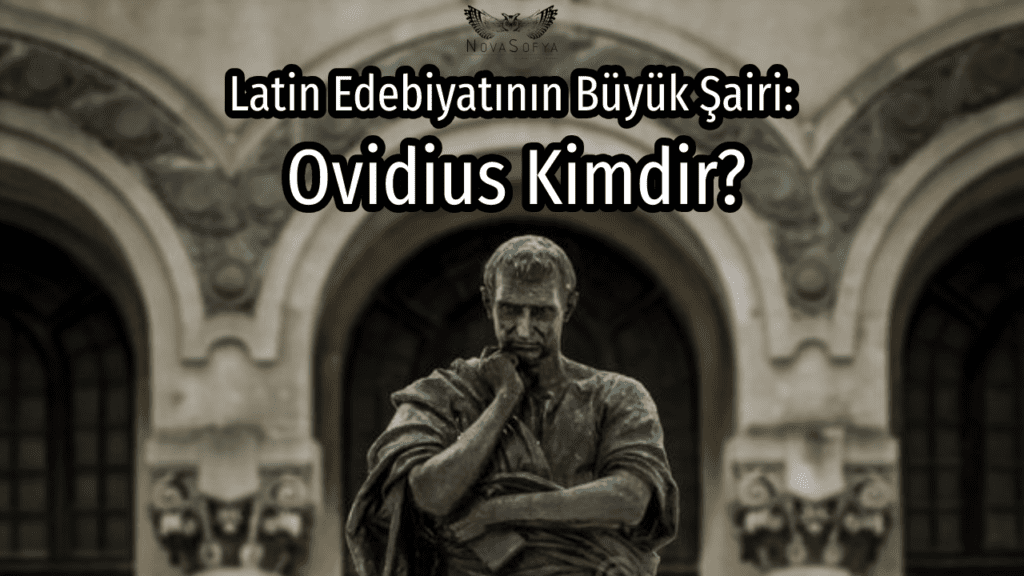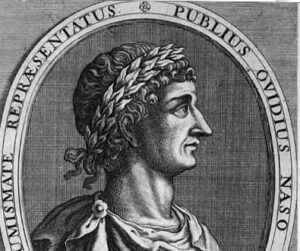The Great Poet of Latin Literature: Who is Ovidius?

Ovidius is considered one of the greatest poets of Latin literature. He inspired both his contemporaries and subsequent generations with his works on the themes of love, mythology and transformation. You can find those who are curious about the life, works and exile of Ovidius in this article.
Ovidius was born in 43 BC in Sulmo (present-day Sulmona) in the Roman Republic. The son of a wealthy and noble family, Ovidius studied rhetoric in Rome. Although his father wanted him to become a civil servant, Ovidius became interested in poetry and went to Athens to become acquainted with Greek culture. Returning to Rome, Ovidius befriended the famous poets Horatius and Propertius.

Ovidius’ first works were the books of poetry Amores (Loves) and Heroides (Heroic Women). In these works, he includes letters written by an imaginary lover named Corinna and the lovers of mythological heroes. Ovidius describes the various aspects of love in an ironic, witty and elegant language. He also advises young people in Ars Amatoria (The Art of Love) how to succeed in love.
Ovidius’ most famous work is his epic poem Metamorphoses. In this work, Ovidius tells more than 250 stories of mythological transformations that took place from the creation of the world to the time of Augustus. Ovidius describes with impressive imagination how humans and gods are transformed into other beings by emotions such as love, jealousy, anger, compassion.
Ovidius’ life underwent a major change in 8 AD. Emperor Augustus exiled Ovidius to the Black Sea city of Tomi (present-day Constanţa) on charges of immorality. It is not known exactly why Ovidius was exiled. Some sources suggest that Ars Amatoria was contrary to Augustus’ moral reforms, while others suggest that Ovidius was involved in a scandal at the court.
During the last 10 years in exile, Ovidius wrote the books of poetry Tristia (Sorrows) and Epistulae ex Ponto (Letters from Pontus). In these works, Ovidius expresses his longing for Rome and his loved ones, the hardships of life in exile, and the hope for forgiveness. Ovidius died in Tomi in 17 AD.
PERIOD OF LOVE
Ovidius’ works are divided into three periods: in the early period, he wrote love poems such as Amores, Heroides and Ars Amatoria. In these works, he described his passion for his lover Corinna, the letters of mythological heroes and the rules of the art of love. In Ars Amatoria he says:
“If you want success in love, you must first get to know the woman you love.” (Ars Amatoria, I, 59)
EPIC PERIOD
In the second period, he wrote epic poems such as Metamorphoses and Fasti. In these works, he described a series of changes from the creation of the world to mythological stories and the months and holidays of the Roman calendar. In Metamorphoses he says:
“Everything changes, nothing disappears.” (Metamorphoses, XV, 165)
EXILE PERIOD
In the third period, he wrote poems of exile such as Tristia and Epistulae ex Ponto. In these works, he expressed the reason for his exile by the Emperor Augustus to Tomi on the Black Sea coast, his pains and his hope of returning to Rome. In Tristia it says:
“My crime was to write poetry, but it wasn’t a crime.” (Tristia, II, 207)
Ovidius is one of the most important representatives of Latin literature. His works have influenced many artists in both the ancient and modern periods.
Some excerpts from the works of Ovidius:
Ars Amatoria (The Art of Love)
“Omnia vincit amor; et nos cedamus amori.”
(Love overcomes everything; let us submit to love.)
“Quod licet ingratum est, quod non licet acrius urit.”
(What is possible is not pleasant, what is not possible burns more.)
“Donec eris felix, multos numerabis amicos; tempora si fuerint nubila, solus eris.”
(As long as you’re happy, you’ll have a lot of friends; if times are cloudy, you’ll be alone.)
Metamorphoses (Changes)
“In nova fert animus mutatas dicere formas corpora.”
(A new soul brings me to tell you about the forms that have been transformed into altered bodies.)
“Fas est et ab hoste doceri.”
(It is also true to learn from the enemy.)
“Video meliora proboque, deteriora sequor.”
(I see and approve of better, I watch worse.)
Tristia (Sadness)
“Perdiderim me si te quoque perdidissem.”
(If I lost you too, I would have lost me.)
“Parva sub ingenti matris se offle ferebat.”
(The little cub was hiding under its grandmother.)
“Sic ego desertis possim bene vivere silvis, quodque mihi deerit, carmine compensabo.”
(So that I can live well in the desolate forests, I make up for with poetry whatever is missing to me.)
And of course our motto:
Ignoti Nulla Cupido!
(We must desire what we do not know!)



